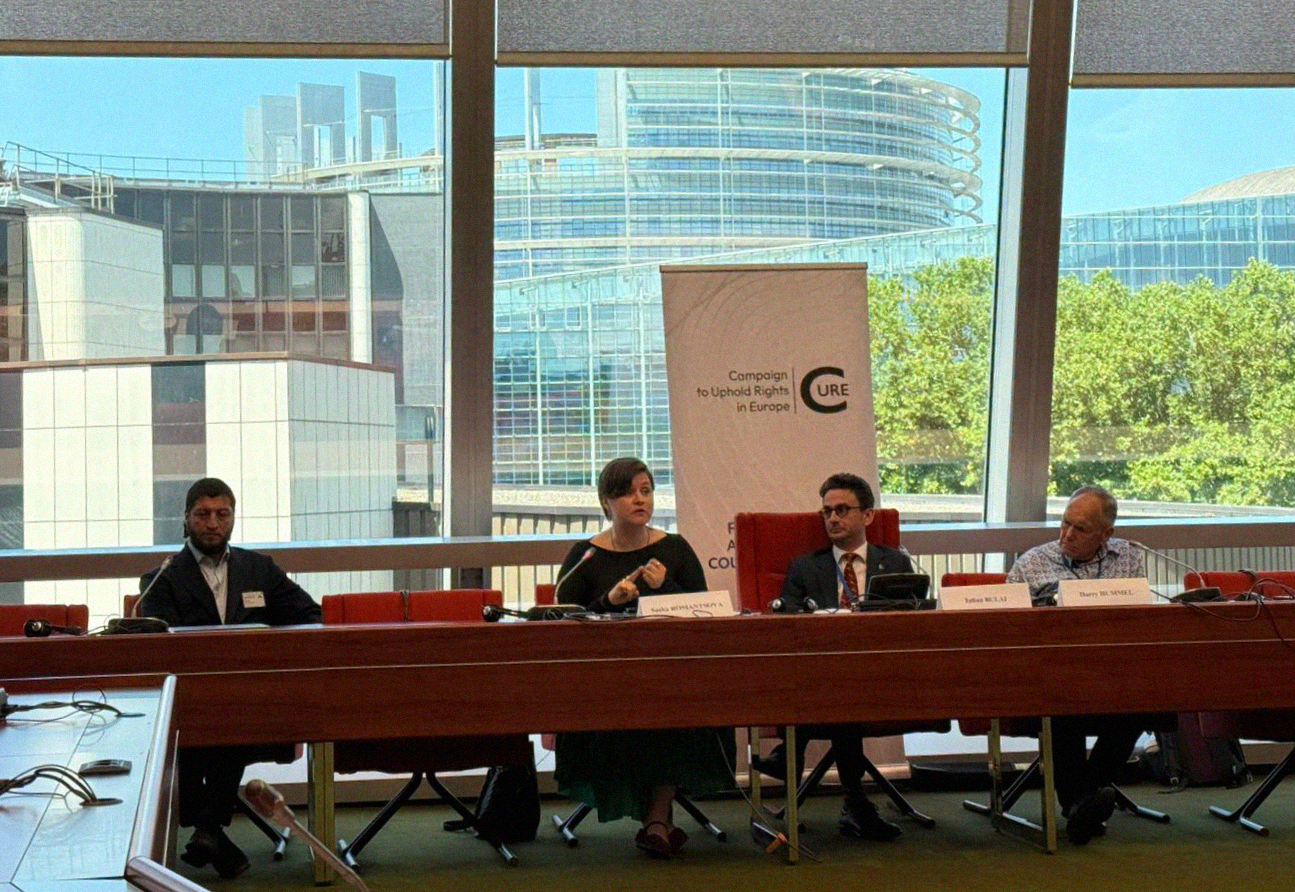Ukrainians in Russian captivity. Oleksandra Romantsova spoke at a side event at the Council of Europe

On June 24, Oleksandra Romantsova, Executive Director of the Center for Civil Liberties, moderated a side event on Ukrainian prisoners in Russian captivity at the Council of Europe in Strasbourg, France. The event was initiated by the Kharkiv Human Rights Protection Group, the Human Rights and Law Foundation, and the People First initiative.
Borys Zakharov, human rights activist and director of the Human and Law Foundation, emphasized that before the last exchange, 10,000 Ukrainian prisoners of war were held in Russian captivity. More than 1,000 of them have returned, but many more remain missing and unrecognized by Russia. The Ukrainian register of missing persons includes 66,000 people, a significant number of whom are civilians. The true number may be higher. These people are being held in at least 127 detention centers across Russia, often in remote regions such as Mordovia, Taganrog, or Minusinsk. Many are transported further away from Ukraine to isolate and break them.
“Torture is widespread and systematic. Prisoners are beaten every day, forced to stand still for 16 hours, electrocuted, including their genitals, raped, both women and men, psychologically humiliated, forced to sing Russian songs, and so on. This is not just cruelty – it is a deliberate strategy to destroy people physically and morally.
Despite the enormous pressure and personal risk, a handful of brave Russian human rights activists and lawyers continue to help us. They search for missing persons, identify places of detention, and sometimes manage to establish contact with prisoners. We are deeply grateful to them for standing on the side of humanity.
We call on the Council of Europe to support the efforts to release every prisoner, stop torture, and bring the perpetrators to justice,” said Boris Zakharov.
Europe is at a crossroads when human rights, democracy, and the rule of law standards are increasingly being questioned. In May 2025, representatives of European civil society published an appeal to the Council of Europe, calling on it and its member states to rise to the challenge at this crucial moment: “The Council of Europe must fulfill its duty to protect rights and peace.” Oleksandra Romantsova also emphasized this during the event, highlighting the topic of justice and accountability for the war against Ukraine, and speaking about related civil society initiatives. In particular, about the People First campaign, in which human rights defenders and activists from Ukraine, Russia, and around the world have united under a clear demand: to put people first in any peace negotiations.
“Thousands of Ukrainian civilians are held by the Russian authorities without legal grounds. Thousands of prisoners of war, both Ukrainian and Russian, are behind bars. Thousands of Ukrainian children have been forcibly transferred or deported to Russia. Hundreds of Russian political prisoners are detained for opposing the war and supporting Ukraine. Indeed, the true extent of abductions, imprisonments, and detentions remains unknown.
The confirmed torture and death of Ukrainian journalist Viktoria Roshchyna in Russian custody shocked the world. Her case is not an isolated one – thousands of people in Russian captivity may face a similar fate if decisive humanitarian measures are not taken.
We call on the international community, which shares humanitarian values, to:
- Use international platforms to demand the release and return of all those in Russian captivity, including civilians, prisoners of war, deported children and political prisoners.
- Ensure that Russia recognizes Ukrainian prisoners of war in accordance with international law, and that the ICRC and UN agencies are granted regular and unimpeded access to all prisoners, as Ukraine does to Russian prisoners of war.
- Call for a visit by the UN High Commissioner for Human Rights to Russian detention facilities.
- Activate the OSCE Moscow Mechanism to report on the detention of civilians.
- Use the media and public platforms to draw attention to the urgent need to release thousands of prisoners.
- Show solidarity with prisoners and deportees through advocacy, public events and support for relevant initiatives.
- Provide material and organizational support to those who help prisoners or deportees.
In addition to presenting the campaign itself, I clearly emphasized that it is very important that the Council of Europe has mechanisms to respond to the hybrid war that the Russian Federation has been waging against Ukraine for 11 years. During a hybrid war, some boundaries between wartime and peacetime are blurred, and the Council of Europe needs new mechanisms to respond to it.
The International Register of Damage and the signing of the agreement on the establishment of a special tribunal against criminal aggression on the basis of the Council of Europe show that it, unlike other organizations, is ready for these changes,” emphasized Oleksandra Romantsova.

